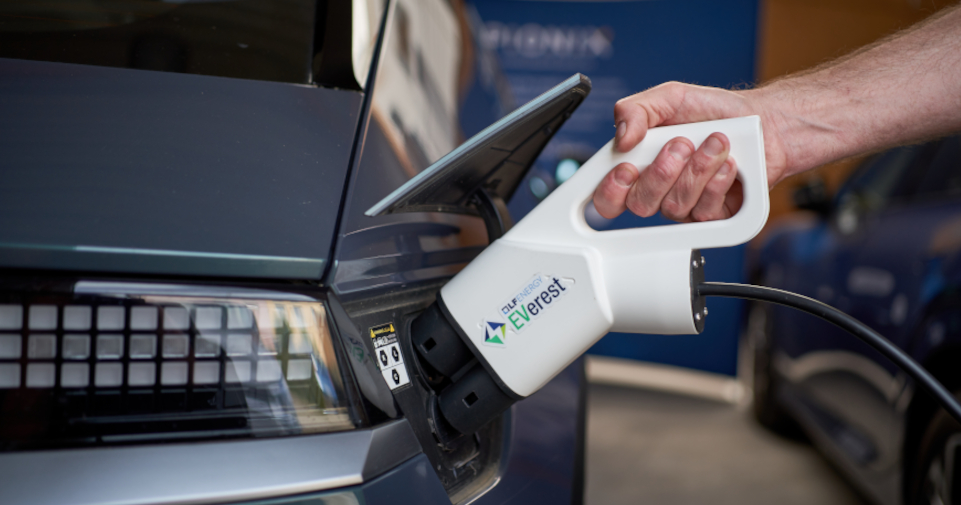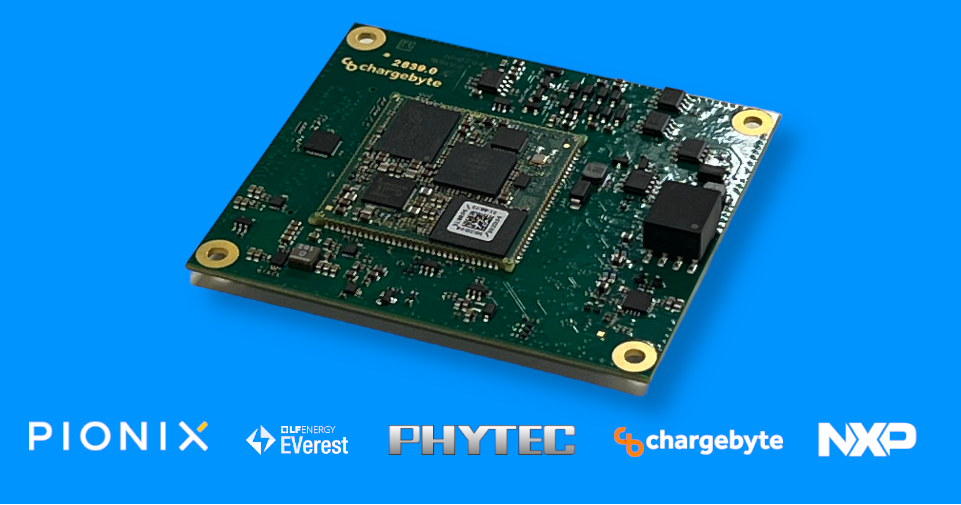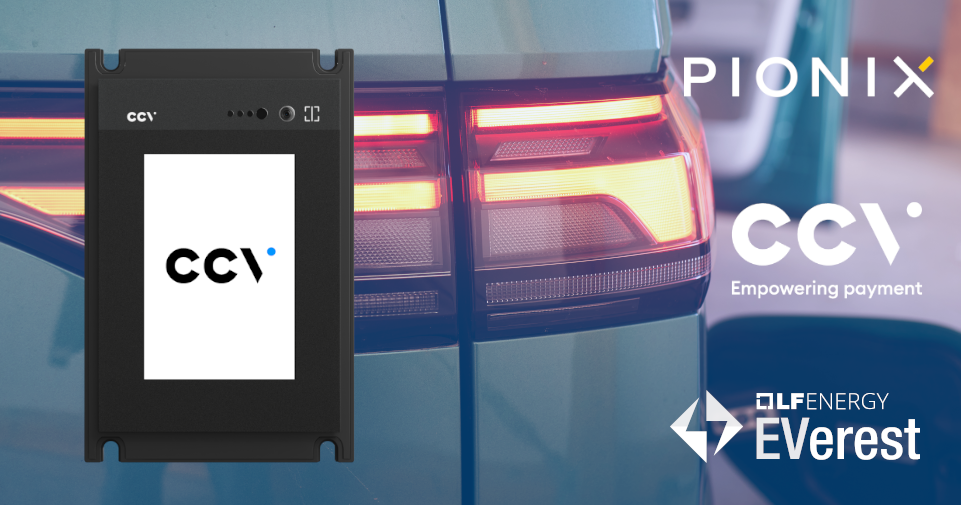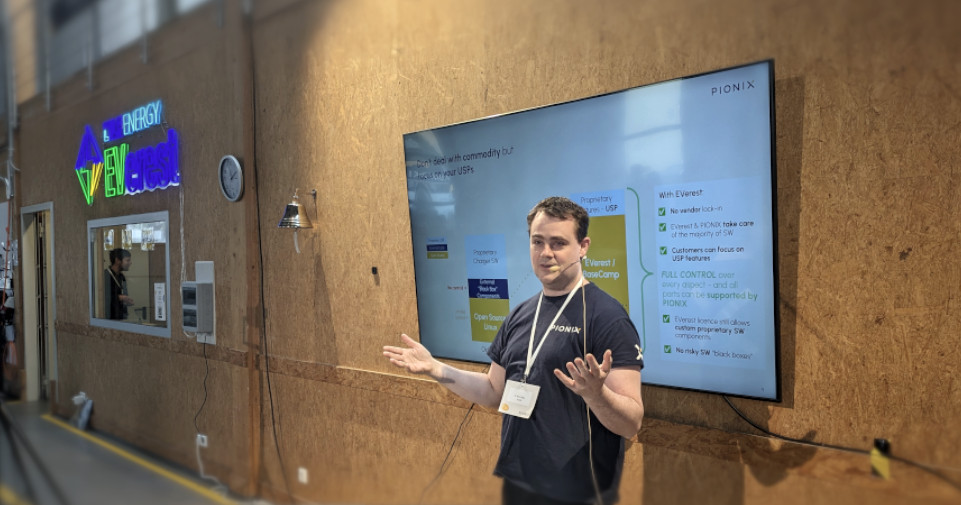There is every reason for station manufacturers to use EVerest. The open source modular framework significantly reduces time to market and helps to save software development and maintenance costs. EVerest is highly modular, and companies can also opt to use only one or more modules from EVerest if they don't yet want to go all in.

Author: Robert de Leeuw, Technical EVangelist at PIONIX
Electric vehicles (EVs) are becoming increasingly popular, and as a result, the demand for EV charging stations is growing rapidly. Most charging station manufacturers are still developing the majority of their charging station software stack themselves. But the truth is:
Spending development effort on commodity software is a waste of money and resources.
The EVerest project, initiated by PIONIX GmbH and since 2022 part of Linux Foundation Energy, is an open source modular framework for setting up a full stack environment for EV charging. EVerest is more than just a couple of independent protocol implementations. It is a modular framework which includes everything needed to support a large number of charging business cases, from a non-managed home charger to a load balancing multiple satellite bidirectional DC charging site.
Why Pionix initiated EVerest
We at Pionix initiated the EVerest project to revolutionize the EV charging industry. We orchestrate its development to become the world's trusted charging station software stack that makes EV charging reliable and the transition to e-mobility faster and smoother.
By utilizing all the open source advantages for the EV charging world, EVerest does not only speed up the adoption to e-mobility. It’ll also speed up the ability to add new features for local energy management, PV-integration and so on. By using EVerest, manufacturers can save time and money on software development, resulting in a quicker time-to-market while enabling them to focus on unique features, e.g. the user or web interface of the charging station.
Benefit from the innovative power of a community
An ecosystem of software developers, businesses and academia has grown up around EVerest. The community constantly improves the software. New versions of protocols are implemented and new EVs are tested. To ensure a high level of stability, quality, and code consistency, PIONIX as the main contributor maintains the EVerest repository. In addition, other companies like Chargebyte have already started to contribute valuable code. And the community is growing. EVerest is by far the most active community within Linux Foundation Energy.
Distributing the burden means reducing maintenance cost
The Consortium for IT Software Quality (CISQ) estimates that software maintenance can cost up to 85% of the total cost of software development over its lifetime. One of the major advantages of using open-source software is the maintenance of the code. There is less code owned by the charging station manufacturer that they must maintain. This underscores the importance of not developing commodity software, as this software must be maintained after it is developed.
By using EVerest, charging station manufacturers can benefit from the expertise and resources of the open-source community. In return, they can contribute to the development of the software or report issues. But there are no requirements to give back to the community. Everest is licensed under the Apache 2 license which gives the charging station manufacturers all the freedom to do with the code what they want. It’s not required to publish all the code running on top of Everest as open source. But of course, any contribution to EVerest is welcomed, as this is how the community will grow.
Be ready for what’s coming next in EV charging
With 2 or 3 new EVs being released every year, it has been easy for charging station manufacturers to keep up with the new EVs being released into the market. But today, as new EVs are released every single week, it’s nearly impossible for manufacturers to test every new EV. In contrast, the growing EVverest community will be capable of testing them all. Many OEMs have already started to realize this and the role EVerest will play in the market.
For example, PIONIX is actively working with OEMs to provide a test system so that the OEM can test any new vehicle or new firmware release with EVerest to ensure compatibility.
The same goes for the CPO side of the charger. Every week, somewhere in the world, there is a new CPO with possibly a new CPMS. As anybody with OCPP expertise knows, there will be differences with any OCPP implementation. As EVerest is the go-to open source charging station software stack, everybody in the industry knows where to find the code. EVerest can be used as a charging station simulator by CPOs. This ensures that any EVerest charger will work with their CPMS. Developers can easily test functionalities without the need of charging hardware.
Solving EV charging industry’s chicken-egg problem
The adaptation of new standards takes time. It’s not unusual that it can take more than five years before a new version or a new protocol is implemented. OEMs are not implementing some protocols because no chargers support them yet. This is because charger manufacturers do not implement a version because CPOs don't have or require support for it, and the other way around.
EVerest’s development process works differently. As soon as a new draft specification of a protocol is available, the community starts implementing it. Working with the relevant standardization body ensures the specification is clear, unambiguous, and can be implemented before releasing the final version of the specification. Experience has shown that a new version or a new protocol can be added to the main branch of EVerest within one or two months. So the chicken-egg problem is solved! Whenever a new EV hits the road, EVerest will be ready.
Providing an unique charging experience
If a charger manufacturer does not want to develop its own charging station software stack, there are commercial stacks available they can use. Open-source software provides greater flexibility and customization options. This means that charging station manufacturers can customize EVerest to meet their specific needs and preferences without being restricted by licensing agreements or vendor lock-ins. This flexibility enables manufacturers to differentiate themselves from competitors and offer unique solutions to their customers.
EVerest is a modular framework for setting up a full-stack environment. The modular software architecture fosters customizability and lets companies configure dedicated charging scenarios based on interchangeable modules. The modules communicate by MQTT. The EVerest framework provides a machine readable definition of module interfaces and types. This is used to abstract the MQTT communication, to enable native language support for C++, Python and Javascript for the communication between modules and it enables automatic dependency checking.
This modularity makes it easy for companies to develop custom modules and use them with the open-source modules and framework of EVerest.
Built to be secure and reliable
Open source software is often more secure and reliable than proprietary software. EVerest, for example, is continuously tested and improved by the open source community. This reduces the number of risks, potential vulnerabilities and errors. As the code is open, security researchers can easily review the code and point the community to potential bugs and security risks.
To provide a maximum of security, the EVerest community has partnered with the Trusted Computing Group (TCG). This means that TCG provides valuable input and knowledge which helps to improve the security of EVerest. This results in the most secure charging station platform in the market.









